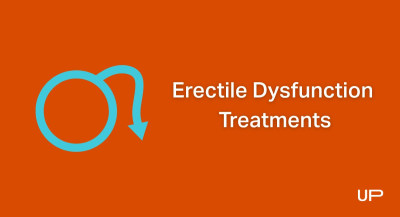Erectile Dysfunction And Age: A Comprehensive Exploration

Erectile dysfunction (ED) is a common sexual health issue characterized by the inability to achieve or maintain a penis erection sufficient for satisfactory sexual performance. The prevalence of ED increases with age, impacting an estimated 40% of men by the age of 40 and nearly 70% by the age of 70. However, age is just one factor among many.
Many misconceptions surround erectile dysfunction, especially in relation to age. One widespread myth is that ED is a natural and inevitable part of aging. While the risk does increase with age, ED is not a foregone conclusion and can often indicate underlying health issues.
Understanding these challenges and debunking such misconceptions are crucial first steps in effectively managing and treating ED across different age groups.
In this article, we are going to cover the following:
- Impact of Aging on Sexual Function
- Erectile Dysfunction in Young Adults
- Erectile Dysfunction in Middle-Aged Adults
- Erectile Dysfunction in Older Adults
- Treatment Options for ED Across Ages
- Lifestyle Strategies for Sexual Health
- Navigating ED: Seek Support and Professional Help
- Concluding Thoughts
- References
Impact of Aging on Sexual Function
Aging brings about certain physiological changes that can significantly influence sexual health. Understanding these alterations can provide valuable insight into the nature of age-related erectile dysfunction.
Hormonal Changes:
With age, levels of sex hormones like testosterone often decrease. This reduction can impact libido and contribute to ED.
Blood Flow:
Aging also affects the cardiovascular system, potentially reducing blood flow to the penis, a critical factor in achieving an erection.
Nerve Function:
As we age, our nervous system - including the nerves controlling erections - may not function as efficiently, contributing to ED.
Psychological Factors:
Older adults may experience stress, depression, or anxiety related to aging, health problems, or changes in their personal life, all of which can influence sexual function.
It's important to note that while these changes can contribute to erectile dysfunction, they are not insurmountable barriers. Various treatment options can help manage these factors and improve sexual function, regardless of age.
Erectile Dysfunction in Young Adults
Though commonly associated with older age, erectile dysfunction can affect young adults too. In this group, ED is often tied to different unique factors.
Lifestyle Choices:
Certain choices, such as tobacco use or smoking, excessive alcohol consumption, illicit drug use, and lack of physical activity, can all contribute to ED in younger individuals.
Underlying Medical Conditions:
Conditions such as diabetes, high blood pressure, hormonal imbalances, or obesity can cause ED, even in young adults.
Psychological Factors:
Stress, anxiety, depression, or issues related to self-esteem or body image can significantly impact sexual function in this age group.
It's crucial for young adults experiencing ED to understand these potential factors and seek appropriate medical consultation. Recognizing that ED is not just an 'old man's problem' can help reduce stigma and facilitate more effective treatment strategies.
Erectile Dysfunction in Middle-Aged Adults
Middle age often brings significant changes to sexual function. In addition to aging-related physiological alterations, other elements can contribute to erectile dysfunction in this phase of life.
Age-Related Changes:
Middle age can bring reduced sexual response and slower erections and ejaculations. These alterations can sometimes lead to performance anxiety and subsequent ED.
Lifestyle Factors:
Sedentary habits, poor diet, and excess alcohol can exacerbate the risk of ED. Smoking, in particular, can affect blood flow and contribute to ED.
Chronic Health Conditions:
Middle-aged adults may deal with chronic conditions like heart disease, diabetes, or high cholesterol that can directly contribute to ED.
Hormonal Changes:
This period may see a decline in testosterone levels, which can impact libido and contribute to erectile issues.
Recognizing these factors can provide a path for managing and treating erectile dysfunction effectively. Proactive health choices and medical consultation can significantly improve sexual health outcomes in middle age.
Erectile Dysfunction in Older Adults
As individuals reach their later years, the impact of aging on sexual function becomes even more pronounced. A variety of factors contribute to erectile dysfunction in older adults.
Aging Impact:
Older age can bring more frequent and pronounced physiological changes, including reduced hormonal levels, decreased nerve sensitivity, and slower sexual response, contributing to ED.
Age-Related Health Conditions:
Conditions that are more common in older adults, like diabetes, heart disease, and prostate issues, can significantly contribute to ED.
Medications:
Many older adults take medications for chronic health conditions. Some of these drugs can have side effects that impact sexual function, leading to ED.
Understanding the specific challenges of erectile dysfunction in older adults can facilitate better management strategies. Age does not preclude sexual health and satisfaction, and there are many treatment options available to older adults with ED.
Treatment Options for ED Across Ages
Despite the challenges that erectile dysfunction presents, an array of treatment options is available to individuals of all age groups. The approach to managing ED can be tailored to address age-related factors and ensure optimal outcomes.
Lifestyle Modifications:
Regardless of age, healthier lifestyle choices can have a significant impact. Regular exercise, a balanced diet, limited alcohol, and no smoking can improve overall health and ED symptoms.
Medications:
ED medications can also be effective across all age groups. However, their use may need to be adjusted for older adults or for individuals with certain health conditions. These medications need a prescription in Canada.
Counseling:
Psychological factors play a role in ED at any age. Individual or couples therapy can be beneficial in addressing these concerns.
Other Interventions:
Other treatments like vacuum erection devices, penile implants, or vascular surgery might be suitable for some individuals, particularly when other treatments are ineffective.
The best approach to managing ED is individualized, considering the person's age, overall health, and personal preferences. Collaboration with healthcare professionals ensures the most effective treatment plan.
Lifestyle Strategies for Sexual Health
Maintaining and improving sexual health is intrinsically linked to one's overall lifestyle choices. By adopting healthier habits, individuals of all ages can promote sexual well-being.
Regular Physical Activity:
Exercise helps maintain good blood flow, which is crucial for sexual function. It also improves mood and energy levels, contributing to overall well-being.
Healthy Diet:
A diet rich in fruits, vegetables, lean proteins, and whole grains can improve heart health, which is vital for proper erectile function.
Stress Management:
High levels of stress can directly impact sexual function. Techniques such as mindfulness, meditation, yoga, or even regular relaxation can help manage stress levels effectively.
Positive Mindset:
Maintaining a positive mindset and open communication about sexual health issues can alleviate performance anxiety and improve sexual experiences.
These lifestyle strategies, coupled with regular health check-ups, can help individuals maintain sexual health and effectively manage issues like erectile dysfunction throughout their lives.
Navigating ED: Seek Support and Professional Help
Addressing erectile dysfunction requires an open dialogue about the issue and the willingness to seek professional help.
Open Communication:
Being open about the issues you're experiencing is the first step toward finding a solution. Sharing concerns with partners can reduce stress and improve the mutual understanding of the situation.
Professional Help:
Healthcare providers can offer a range of treatments and help devise a personalized management plan. Don't hesitate to discuss ED openly; it's a common issue they're trained to handle.
Sexual Health Specialists:
In some cases, referral to a doctor, urologist, or other sexual health specialist may be beneficial for exploring more specialized treatments.
Support Networks:
Reach out to support groups, either in person or online. It can be comforting and helpful to connect with others who are navigating the same challenges.
In the journey to address age-related erectile dysfunction, remember you're not alone - professional help and supportive communities are available and ready to assist.
Concluding Thoughts
Age and erectile dysfunction are closely intertwined. As we've explored, the physiological changes that occur with aging can impact sexual function, leading to challenges such as erectile dysfunction. This common condition manifests differently across the age spectrum, influenced by unique factors at each stage of life. However, understanding these age-related changes and addressing them with appropriate treatment options can significantly improve sexual health and quality of life.
The key is not to view aging as an inevitable decline in sexual function, but as a phase where adjustments might be necessary. Open communication, professional help, lifestyle modifications, and appropriate treatments can help manage erectile dysfunction effectively, regardless of age.
The goal of this discussion is to empower individuals to take proactive steps in managing their sexual health. By doing so, they can enhance their overall well-being and continue to lead fulfilling lives, even as they age. Remember, sexual health is a lifelong journey that doesn't end with the advent of wrinkles and gray hair. Take charge, seek help when necessary, and age with grace and vigour.
References
UPGUYS has strict sourcing guidelines to ensure our content is accurate and current. We rely on peer-reviewed studies, academic research institutions, and medical associations. We strive to use primary sources and refrain from using tertiary references.- Erectile Dysfunction, Cleveland Clinic
https://www.clevelandclinicmeded.com/medicalpubs/diseasemanagement/endocrinology/erectile-dysfunction/ - Sexuality and Intimacy in Older Adults, NIH
https://www.nia.nih.gov/health/sexuality-and-intimacy-older-adults - Aging related erectile dysfunction—potential mechanism to halt or delay its onset, NIH
https://www.ncbi.nlm.nih.gov/pmc/articles/PMC5313305/ - Physiology, Testosterone, NIH
https://www.ncbi.nlm.nih.gov/books/NBK526128/ - Heart Health and Aging, NIH
https://www.nia.nih.gov/health/heart-health-and-aging - Erectile dysfunction in fit and healthy young men: psychological or pathological? NIH
https://www.ncbi.nlm.nih.gov/pmc/articles/PMC5313296/ - Erectile Dysfunction In Younger Men: A Guide, The Urology Clinic
https://urologyclinic.com/posts/erectile-dysfunction/erectile-dysfunction-in-younger-men-a-guide/ - Changes in sexual function in middle-aged and older men: longitudinal data from the Massachusetts Male Aging Study, NIH
https://pubmed.ncbi.nlm.nih.gov/15341552/ - Sexuality and Intimacy in Older Adults, NIH
https://www.nia.nih.gov/health/sexuality-and-intimacy-older-adults - Erectile Dysfunction in the Elderly: An Old Widespread Issue with Novel Treatment Perspectives, NIH
https://www.ncbi.nlm.nih.gov/pmc/articles/PMC3976909/ - Lifestyle modifications and erectile dysfunction: what can be expected? NIH
https://www.ncbi.nlm.nih.gov/pmc/articles/PMC4291878/
This article is written for informational purposes only and does not constitute medical advice. The information provided in the articles cannot and should not replace advice from a healthcare professional. Talk to your healthcare provider about any physical or mental health concerns or the risks and benefits of any treatment or medication.






